The myth of Lucretia, first told by Livy, tells of the rape of Collatinus’s eponymous wife by his fellow soldier, Tarquinius, the son of the Etruscan king who rules over Rome. Jealous of Collatinus’s boasting about Lucretia’s virtue and chastity, Tarquinius rides to Collatinus’s house and attacks Lucretia. Knowing that her violation – an assault on Collatinus’s ‘property’, one which is symbolic of the abuse of the ruled state itself – brings dishonour on her husband’s name, Lucretia sends a messenger to summon Collatinus home, makes a public confession and kills herself. According to Roman custom, her death restores her husband’s honour, acts as a catalyst for a Roman rebellion against the Etruscans and thus serves as a revolutionary act which leads to a more consensual form of political rule.
In his new production of Britten’s The Rape of Lucretia (a co-production by Britten Pears Arts and the Royal Opera House), director Oliver Mears attempts to drag the Roman myth and Britten’s 1946 opera into the twenty-first century. Premiered during a Britten Weekend at Snape Maltings, and shortly to be staged in the ROH’s Linbury Theatre, Mears’s production aims to dramatise the brutalisation of combatants and the weaponisation of violence against women in the context of war. It is a drama of toxic masculinity, female victimhood and of crimes, so often unreported and unpunished, here exposed.
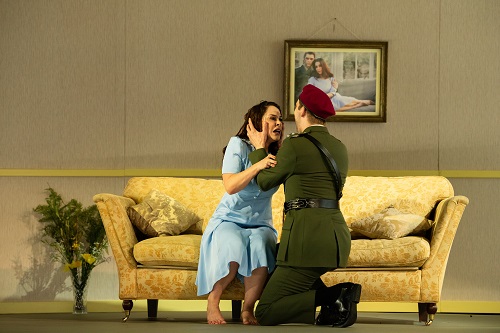
Mears seems concerned with both the consequences of the war and cataclysmic events that Britten had just lived through in 1946 and with the wars of our own time. I’m not sure that ‘war’ is what Britten’s opera is really about, though. Yes, it takes place during a period of conflict, and Britten brings the soldiers’ dangerous, inebriated revelry to life in his opening scenes. Moreover, the evidence of the libretto suggests that Ronald Duncan seems to have identified with the masculine power and virility of Tarquinius. In the interlude in which the latter rides to Lucretia’s house, the Male Chorus seems to exult in the soldier’s machismo: “In [both] blood furious,/ With desire impetuous/ Burns for its quietus;/ With speed aflame through sweat and dust/ The arrow flies straight as lust.”
The first English Opera Group production, at Glyndebourne in 1946, was set in ancient Rome and utilised a rather stylised classical design. But, Britten seems to have been less interested in the Roman soldiers and to have identified more strongly with Lucretia, not as a woman of flesh and blood, but as a site for tension between desire and violence whose beauty and virtue co-exist in an unstable alliance, as likely to incite lust and goodness. Why does she commit suicide? As St Augustine wondered, ‘If she is adulterous, why is she praised? If chaste, why was she put to death?’ Perhaps to make sense of her death, Duncan added an anachronistic Christian framing device to his florid, verbose libretto, which has no relevance to the original Roman context – though, in fact, the libretto drafts confirm that it was Britten who proposed the much-criticised Christian epilogue which was intended to verify the redemptive nature of Lucretia’s death.
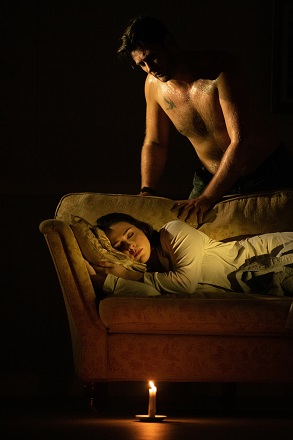
Mears’s production does have the virtue of trying to simplify some of the ambiguities and non sequiturs, though in pushing them aside it doesn’t actually resolve them. Annemarie Woods gives us a single set: a domestic interior – crisp and clean, sparsely furnished, all light colours and fabrics, with a white billowing curtain across the French windows to keep out the more unpleasant things of modern life. On the wall, a Hello!-style framed photograph extols the married bliss of Collatinus and his wife. Lucretia perches demurely on her embroidered creme sofa to eulogise her absent husband in a TV interview. When she lies dead and bloodied on the floor, she will be photographed by Junius (Kieran Rayner): tabloid fodder or political propaganda? It’s not clear.
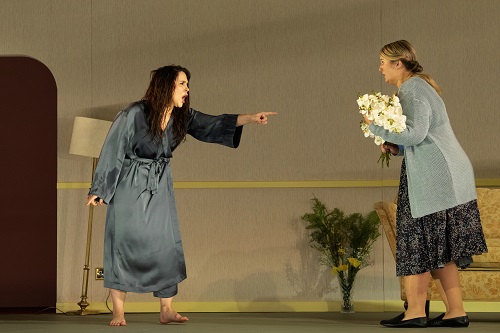
The pristine domestic interior is a feminine space, all flower vases and florals. There’s little strong sense, in the design at least, of the contrast between masculine and feminine – and more importantly, perhaps – public and private worlds. (Lucretia’s confession must be public if it is to restore her husband’s honour.) Lowered lighting (D.M. Wood) has to work hard to take us to the soldiers’ encampment, where a Nigella-style tabloid spread, ‘At Home with Lucretia’ is pinned to the wall. But, the male aggression is palpable. There’s a horrid episode where a female prisoner is beaten by some soldiers. Jolyon Loy’s Tarquinius – tall and hulking – positively gloats and glories in his own masculine aura, though later it’s suggested that he is suffering from PTSD, haunted by flashbacks of battlefield brutality and bloodshed. The feminine scenes, of linen-folding and flower-arranging, do cleanse the air – Carolyn Holt (Bianca) and Sarah Dufresne (Lucia) sang with shining purity – even as they suggest that Britten had little natural understanding of the female psyche.
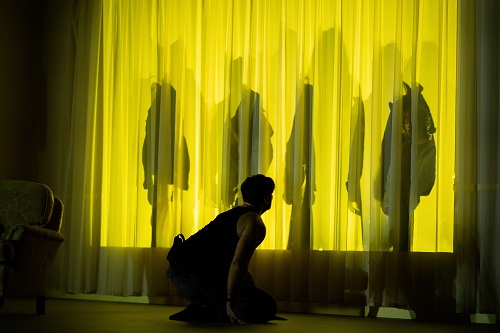
As Lucretia, mezzo-soprano Anne Marie Stanley sang with luscious tone and vivid dramatic presence, but her death failed – for this listener at least – to make the theatrical impact that surely it should, perhaps because it seemed born solely of trauma. There was little sense of agency or tragic import. The words of Collatinus (Anthony Reed) seemed oddly dry and unmoving: “What Tarquinius has taken/ Can be forgiven;/ What Lucretia has given/ Can be forgiven.” Where was the new emotional maturity which might lead Lucretia’s self-sacrifice to serve as a means to liberate Rome from the Etruscans, or in modern terms, to bring about societal change and healing?
Mears’s handling of the Male and Female Chorus (Michael Gibson and Sydney Baedke) is innovative and effective, though. So often they are presented as Christian ciphers, exploited to emphasise the ritualistic element, to distance the audience, both in terms of time and space, and moral estrangement. Here, they were figures of flesh and blood, their Christianised words – more verbal ostentation from Duncan – seemingly designed to help them, not us, make sense of the tragedy they witnessed and scrutinised, tensely clutching files of documents. They drew a white curtain across the wide Snape Maltings stage when Tarquinius mounted Lucretia’s bed, dagger in hand, and although Britten does not depict the rape and there is no ‘musical violence’ to accompany the violation, their suffering was unmistakable and moving. So often the frame pushes the audience back; here, dressed casually, moving naturally among the cast, coming beseechingly to the forestage, the Male and Female Chorus really engaged the listener. At the end, the Female Chorus seemed truly anguished, “Is this all loss? Are we lost? … It is all?”, and the Male Chorus’s words of comfort sincere.
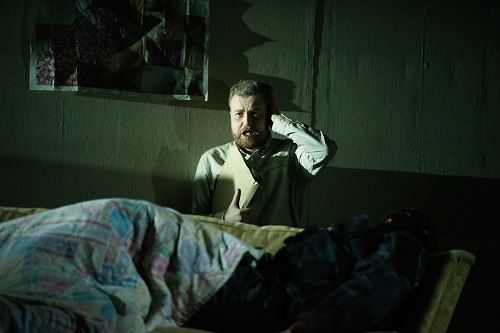
The young cast, drawn from the Britten Pears Young Artist Programme (currently celebrating its 50th anniversary) and the ROH’s Jette Parker Artists Programme, sing well, and are sensitively supported by twelve musicians of Aurora Orchestra. Conductor Corinna Niemeyer has an astute ear for Britten’s instrumental colours though she doesn’t bring forth all the violence in the score – the playing feels rather ‘chaste’ at times.
Perhaps the problem lies in the conflicts and ambiguities within the opera – between text and score – which cannot easily be resolved. Despite this, Mears has made a good attempt, in the words of the Chorus, “with worn words and these brief notes” to try to “harness song to human tragedy”.
The Rape of Lucretia will be performed in the Linbury Theatre at the Royal Opera House from 13-22 November.
Claire Seymour
Britten: The Rape of Lucretia
Lucretia – Anne Marie Stanley, Bianca – Carolyn Holt, Lucia – Sarah Dufresne, Tarquinius – Jolyon Loy, Collatinus – Anthony Reed, Junius – Kieran Rayner, Female Chorus – Sydney Baedke, Male Chorus – Michael Gibson; Director – Oliver Mears, Conductor – Corinne Niemeyer, Set and Costume Design – Annemarie Woods, Lighting Design – D.M. Wood, Movement director – Sarita Piotrowski, Fight Director – Bret Yount, Intimacy Director – Ita O’Brien (for Intimacy on set), Aurora Orchestra.
Snape Maltings, Suffolk; Sunday 30th October 2022.
ABOVE: Anne Marie Stanley (Lucretia) Jolyon Loy (Tarquinius) © Camilla Greenwell